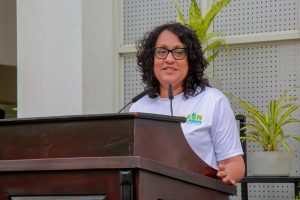Apostolic Nuncio speaks about the value of education to the Plantation sector of Sri Lanka

“Promises made by the government to deliver quality education to all children need to be followed through, considering that education is a fundamental right and not a privilege enjoyed by a few. Besides issues, such as the root causes of poverty in the plantation sector of Sri Lanka and its need for educational equity and justice need to be addressed,” said Dr. Brian Udaigwe, Apostolic Nuncio for Sri Lanka.
“This research sheds light on the stark realities endured by workers and children in this sector. The future of this community relies not only on policy changes but on empathy-driven action,” he stressed.
Caritas Sri Lanka SEDEC Organization recently launched two research publications based on a study that explored challenges faced by estate sector children in terms of their right to education and another study on the culture and identity of people in this sector.
Dr. Brian Udaigwe, Apostolic Nuncio for Sri Lanka was the chief guest at the event. Bishops Dr. Harold Anthony, the Chairman of the Catholic Bishops’ Conference of Sri Lanka (CBCSL) and Dr. Valence Mendis, Bishop of Kandy Diocese and Hon. Justice S.Thurairaja PC, Supreme Court of Sri Lanka, and Mr. W.A.L. Wickramarachchi, Director-Ministry of Environment, Plantation, Wildlife, Forest Resources, Water Supply and Community Infrastructure were special invitees to the function.
Additionally, Diocesan directors, religious leaders, distinguished academics, civil society members, and the Caritas staff also participated in this significant event.
On the 3rd of October 2024, Caritas Sri Lanka proudly launched two groundbreaking research documents aimed at transforming the lives of the plantation community in Sri Lanka: “Right to Education for Plantation Children: Issues, Challenges, and Future Directions” and “Culture and Identity of the Plantation Community in Sri Lanka”. These studies are more than just academic work—they are tools for advocacy, equity, and social justice.
The study concluded that the Sri Lankan education system needs urgent reform to address emerging issues in the plantation community with regard to policymaking, implementation, and regulatory levels. One important observation is with regards to the literacy rate among females in the plantation sector. The research indicates that the literacy rate in the plantation community still lags behind that of the non- estate rural population. This gap is more pronounced for females, who lag their rural counterparts by 16% while the gap among males is only 6% (World Bank, 2007).
The research further revealed that the estate sector exhibits a high dropout rate, with an average of 8.4 percent in grade five, compared to the national average of 1.4 percent, as reported by the Ministry of Education. In the Nuwara Eliya district, the male transition rate from primary to secondary levels is lower than in other districts, with many boys being forced to join the workforce. Additionally, children in plantation communities are less likely to complete both primary and secondary education than their urban counterparts.
Apostolic Nuncio Dr. Udaigwe added; ‘‘Findings from the research documents reveal how poverty, deprivation, and lack of facilities continue to hinder educational access for children in the plantation sector.”
There are persistent barriers to education that still affect not just individuals, but entire communities for generations.
‘Education is not just about attending school; it’s about breaking the cycle of poverty and creating opportunities for future generations. This requires an inclusive and equitable approach to education, ensuring that every child, regardless of their background, has access to quality learning opportunities.” he added.
‘There needs to be a deeper sense of empathy in addressing the challenges faced by the plantation sector. The situation should not be approached with mere sympathy, which often manifests as pity for the plight of the disadvantaged. Instead, we need to embrace empathy, to truly understand and share in the experiences of these communities.
‘Your initiatives for charity and social work must be rooted in the words and deeds of Christ. Caritas needs to focus on love, understanding and genuine connection in its projects. Charity must not be reduced to simply “doling out money and resources,” but rather must be a reflection of gospel values that prioritize the dignity of every individual.
The Nuncio further stressed that the government, the Church, and other assisting parties must collaborate in creating an educational landscape that is just and accessible to all.
“The work done by Caritas Sri Lanka must be grounded in empathy, ensuring that the voices of the marginalized are heard and their needs are met with compassion and understanding,” he said.
The study further recommends that the government should implement inclusive development policies, advocacy programs for cultural preservation funding, recognition and legal protection, promote culture-based and eco-tourism programs, cultural documentation and archiving, inter-community dialogues and networks among others.
Dr. Udaigwe also appreciated the tireless efforts of Caritas Sri Lanka, which has been working for decades to advocate for the dignity and rights of marginalized communities. As a Catholic organization, Caritas Sri Lanka has been instrumental in creating awareness and pushing for social change, particularly in the areas of education and empowerment.
END.









